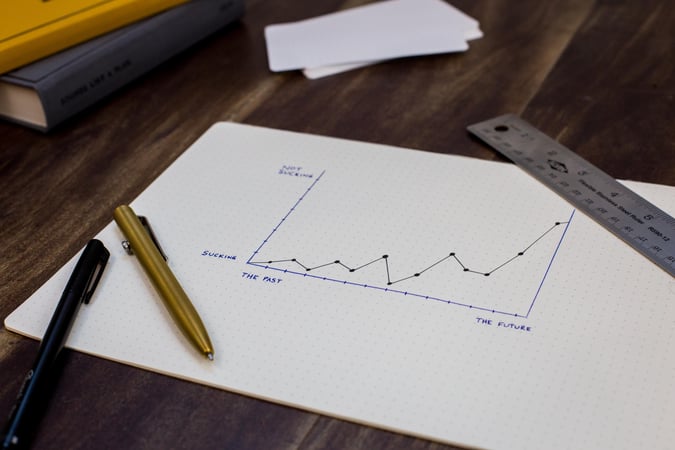Website development and SEO are sometimes seen as separate disciplines. But this is really an...
The Rapid Acceleration of Digital Strategy
Post Pandemic insight for marketing leaders.
As a marketing and/or sales leader, you are not alone if you were shaken up by the pandemic’s impact on your business strategy. The overnight redesigning, restrategising, reactive planning and tactical execution demonstrated by marketing teams was impressive, and as it turns out permanent.

An explosive report by a new McKinsey Global Survey demonstrated that, in response to the pandemic, there was a radical acceleration of the digitisation of companies' customer and supply-chain interactions by three to four years. This includes marketing.
During the pandemic, Fingo supported many businesses to pivot their efforts and strategies to the online space, and we observed that for our clients, the cost of not doing so was extremely high.
Data from Accenture confirms that e-commerce transactions will more than double from summer 2020 levels and the dramatic rise in e-commerce and multichannel sales looks set to continue. Further there will be a huge increase of 169% in e-commerce purchases, from new or low-frequency users post-outbreak. Forrester identified that retail or B2C (business-to-consumer) marketing is up by a remarkable 15% in 2021.
But this isn’t just an e-commerce change. We supported multi-sector clients in this area, because the expectation of digital to enable business continuation touched every cornerstone of company process and brand strategy.
Below, we review why today's businesses need to adapt to these new market conditions. We also explain why digital strategy should be integrated within your business, sales and marketing strategy, and not be seen as a stand alone afterthought.
Please read on as we reveal how to do digital better.
The pandemic was the great equaliser for brands.
The pandemic galvanised opportunistic new businesses, who were able to competitively position themselves online and attract audiences who were formerly brand loyal. It was the great equaliser for brands.
A strong example is the well established UK retail store B&Q which experienced serious website infrastructure and stock software issues due to the unexpected surge in traffic of DIY enthusiasts. This caused waiting times of over an hour before loyal customers could even visit the website.
Google doesn’t care about the size of an organisation, it’s core objective is to serve the user and match their search query as quickly and accurately as possible. A huge rise in general keyword search terms for Home Improvement* and growth in consumer interest in DIY during the pandemic provided a strong opportunity for lesser known brands with strong SEO to take advantage of the available market share following the B&Q website issue which left audiences looking for alternatives.
Across the board, the myriad of changes and a newly emerging emphasis on excellent digital execution became more prominent, and consequently, brand loyalty suffered immensely. Twitter Business explains:
“This general change of behavior in response to COVID-19 has also been reflected in a shattering of brand loyalties. Almost half of consumers are trying new brands, and a third are incorporating new private-label brands into their shopping repertoire.”
SEO, Paid Advertising and Social Media wins
For marketers, this highlights the need to adopt integrated, multichannel digital techniques, because shoppers are now more likely to use search engines or social media, instead of directly seeking out their favourite brand.

Retail Gazette provided insight from retail leaders on how the pandemic shaped marketing strategies which have had to be adapted:
“The world has moved online, forcing the nation’s favourite retailers to rethink the way they speak to their customers. Social selling has also been on the rise, so having a multi-platform strategy to include presence across online, social media and media coverage is essential for retailers.”
To illustrate the above, Forbes has identified the changes in the cultural zeitgeist of consumer behaviour, which looks like nothing brands have seen before:
“Consumers are in a constant state of passive shopping. They shop while they scroll Instagram or TikTok; they shop while reading the news online; and they shop while in Zoom meetings with colleagues.”
On social media strategy Retail Gazette noted “Instagram and Pinterest are acting as sources of inspiration for everyone from the everyday DIYer to an avid designer”.
At Fingo, we’ve enjoyed 18 years of delivering integrated, high performing digital marketing strategy. Strategic SEO, Paid Social advertising campaigns, with Paid Search strategies helped to build brand visibility, attract new customers and boost revenue for businesses who relied on our support during the pandemic.
High Performing Websites were the unsung hero of COVID
The pandemic shone a light on the clear digital divide between inadequate websites that were not designed with growth in mind, and their technically savvy counterparts. A clear example is the wine retailer Majestic's website crash stemming from inadequate website infrastructure. In contrast, UK wine merchant Berry Bros. & Rudd experienced its biggest day of online trading as the lockdown drove consumers to its pages, which could technically handle the influx. Forbes reports that
“Shopping in this brave, new economy is less about choosing whether to buy products online or in stores and more about how shopping fits into consumers’ schedules. Consumers now ask one simple question for every purchase they make: Do I need it today, or can it wait?”
With this in mind, understanding the importance of a high performing website as a key business asset that either boosts or undermines the customer journey, is the difference between business growth or stagnation in most instances. Websites that do not receive sufficient investment or strategic thinking can start to experience a range of problems, leaving brands vulnerable to competitors (as illustrated in our example above).
Insight from the Retail Gazette quotes Martin Reiter, Head of Europe at Wayfair:
“At a time like this, a fast and frictionless shopping experience and excellent customer service are also absolutely key, to not just stand out but drive repeat business.”
Poorly designed websites with weak technical infrastructures can negatively impact excellent paid marketing efforts too, when the disappointing user experience fails to convert all the leads.
At Fingo we regularly tackle:
- User experience design and conversion rate optimisation
- Website technical infrastructure and performance
- On site engagement through performance design and development
- Form and link functionality repairs
- Improving unengaging, confusing or frustrating user experiences
- Slow and sluggish websites that are not compatible with the latest browsers
- Sites that are unresponsive to latest devices
Why digital transformation and reinvention are crucial
Where necessary, both new and established brands have had to push and increase their momentum towards digital business models. These innovations will become lasting pillars for the businesses concerned with thriving and succeeding after the pandemic.
Thus, businesses should not underestimate the importance of being prepared for digital growth and change. As demonstrated, a successful approach involves considering:
- Designing customer journeys and touchpoints across multiple platforms and channels
- Understanding the value of each customer touch point and responding strategically
- Websites designed with long term growth, stability and scalability as part of their development
- User experience as a cornerstone of all digital strategy
- Digital underpinning real-world business risk mitigation, for example: web page failure, low stocks, lack of delivery drivers etc.
How Fingo delivered digital excellence during the pandemic
Fingo were delighted to step in and work within the wine industry to help prevent further crisis, with our integrated digital strategy and delivery for Corney and Barrow during the pandemic.
Corney and Barrow is one of the UK’s oldest independent wine merchants. As customers increasingly turned to online purchasing, management approached Fingo to develop and implement a robust digital strategy and protect its leading position.
Campaign results
- Revenue up by 154%.
- Sales targets exceeded by 14%.
- 1,567% return on investment in six months for paid search activity.
- 72% increase in website visits, year-on-year.
- E-commerce revenue increased 48%.
- Total transactions up by 18%.
- 1,926% return on advertising spend (ROAS) in weeks 4-7.
- 12,065% ROAS in weeks 8-12.
Fingo also worked with Galliard Homes to deliver a multi channel digital strategy. Founded in the 1990s, Galliard Homes is London's largest privately-owned residential property developer. The launch of Papermill House in Romford was an ambitious project, with the pandemic complicating an otherwise buoyant time of year. Fingo were delighted to deliver a multi channel digital strategy which produced compelling results.
Pre-launch campaign results
- Booked back to back on open days
- Exceeded sales targets on launch weekend
- 64 Conversions via SEARCH
- 93 Conversions via SOCIAL
- CPAs delivered well below target
- Performed 140% above industry benchmarks*
*Industry (property) average: Search and Social 1%
Overall campaign
- Papermill House accounted for 33% leads across the entire Galliard website, making it the strongest performing development across the whole portfolio of 19 developments in Q3-Q4 (July to October).
- 505 lead conversions through SEARCH Aug- March
- 881 lead conversions through SOCIAL Aug- March
- CPA well below target
How Fingo can help you
Fingo has been delivering integrated digital strategy and performance marketing since 2003. Based in the UK, we’ve been lucky enough to partner with clients from various sectors including E-commerce, property development and Financial Services. As one of the UK's leading marketing experts, we consistently perform 10% higher than the Google Premier Partner threshold.
Please call us on 01372 749200 or contact us by email. We will be delighted to help.
- Established in 2003
- Based in UK
- Google Premier Partner
- Fully certified Google team
- Top 3% of UK marketing agencies
- Manage client media budgets of over £4.5m annually

.jpg?width=50&name=Headshot%20(2).jpg)




